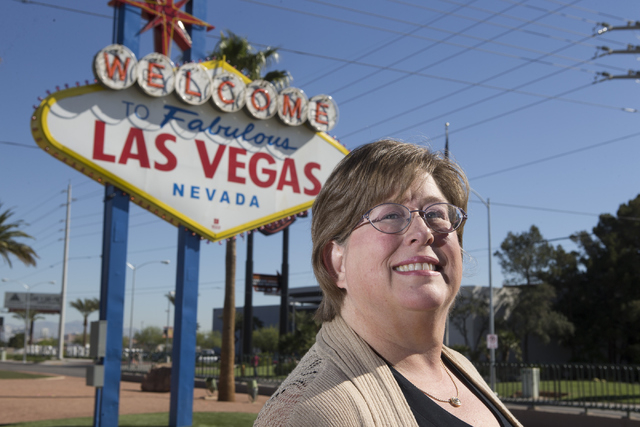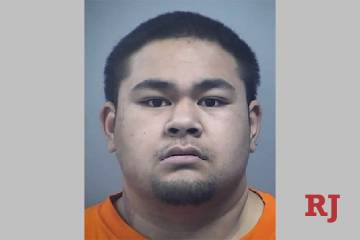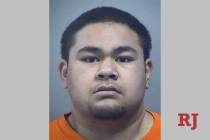Nevada women more likely than others to be killed in domestic violence-related shooting, study says
Women in Nevada are 65 percent more likely to be fatally shot by an intimate partner than women in other states, according to a new study.
The study, released this week by Everytown for Gun Safety and the Nevada Network Against Domestic Violence, uses data from domestic violence-related gun homicides from 2010 to 2014 to find patterns. It also includes stories from each of the 46 cases.
“The stories are important,” said Lisa Lynn Chapman, the network’s communications coordinator. “These are real people, and these are real tragedies that happened in our communities. They’re not a percentage, and they’re not a statistic.”
One of those real stories unfolded early Tuesday, when a husband and wife died in an apparent murder-suicide at La Villa Vegas Mobile Home Park on South Mojave Road, near East Charleston Boulevard. Las Vegas police said a man fatally shot his wife with a shotgun, then killed himself. They said the man had a criminal record with at least one incident of domestic violence involving his wife.
The Nevada Network Against Domestic Violence is a statewide victim advocacy organization that lobbies for better domestic violence policies and helps member organizations at the local level with training and best practices.
Chapman, who joined the organization in January, said it got involved with Everytown for Gun Safety, a gun control group, to draw attention to a serious issue in the state: Nevada consistently ranks among the top states for the number of women killed by intimate partners.
Nevada ranks fifth in the nation, according to the study. There were 6.6 domestic violence gun homicides for every million Nevada women, compared with 4 nationally.
That’s why the network’s board endorsed a November ballot question that would extend firearm background checks to private party sales and some transfers. Everytown for Gun Safety is also promoting the measure.
But gun rights groups, including the National Rifle Association, maintain that the best way to protect women is to make it easier for them to protect themselves. The association recently supported legislation in Michigan and Virginia that would have given victims of domestic violence expedited access to concealed carry permits, but those bills were vetoed by the states’ governors. Michigan’s governor signed a subsequent version of a bill expanding domestic violence victims’ access to concealed weapons permits into law in a later session.
“This debunked so-called study is more misinformation being spread by New York City billionaire Michael Bloomberg’s out-of-state gun control groups as part of their coordinated effort to force gun control on law-abiding Nevadans,” NRA spokeswoman Catherine Mortensen said.
Former New York City Mayor Michael Bloomberg co-founded Everytown for Gun Safety.
“The best approach to protecting victims of domestic violence is to stop abusive behaviors and ensure victims have the ability to protect themselves,” Mortensen said. “Bloomberg’s gun control ballot initiative will not stop abusers from harming their victims because criminals don’t follow the law.”
Sarah Tofte, deputy research director for Everytown and the report’s lead author, said she worked on a similar census of domestic violence gun homicides in another state, but the patterns in Nevada were unique.
For one, more perpetrators in Nevada had histories of abuse before the homicides, she said. Twenty-six percent of the perpetrators had criminal histories that made owning a firearm illegal. Of those 12 shooters, nine had convictions for domestic violence.
Tracing where the guns used in those crimes came from was difficult. Tofte and her team were able to find only information about the guns in six cases where the shooters were prohibited possessors. Two of the guns were bought in private sales, two were stolen, one was borrowed from a friend, and one was left behind by a relative who died.
And of the 5,379 rejected federal background checks from Nevada over the last three years, 959 were rejected because of domestic violence convictions, according to the study.
“We know that (universal background checks) can make a huge difference to women in Nevada,” Tofte said.
Everytown studies have suggested that states that expanded background checks have seen 46 percent less women fatally shot by intimate partners.
But the NRA said the language of the background check initiative would criminalize some of the commonplace practices of law-abiding people who want to exercise their Second Amendment right to self-defense. Gun rights advocates fear that, under the proposed law, a victim of stalking or domestic violence who can’t afford to buy a gun would not be permitted to borrow one from a friend until the very moment her attacker is standing over her with a deadly weapon.
Chapman said she knows that expanding background checks won’t prevent every homicide.
“We can help prevent some of them, and that’s important,” she said.
She said she also wants to see the Nevada Legislature expand a 2015 law that prohibits domestic abusers from buying firearms. She thinks it also should require the abusers to surrender the weapons they have.
“We have a lot of work to do still,” Chapman said. “It’s all about making Nevada safer.”
She recommended that anyone caught in a violent relationship contact Safe Nest at 702-646-4981 or Safe House at 702-564-3227 for help.
Contact Wesley Juhl at wjuhl@reviewjournal.com and 702-383-0391. Find @WesJuhl on Twitter.






























